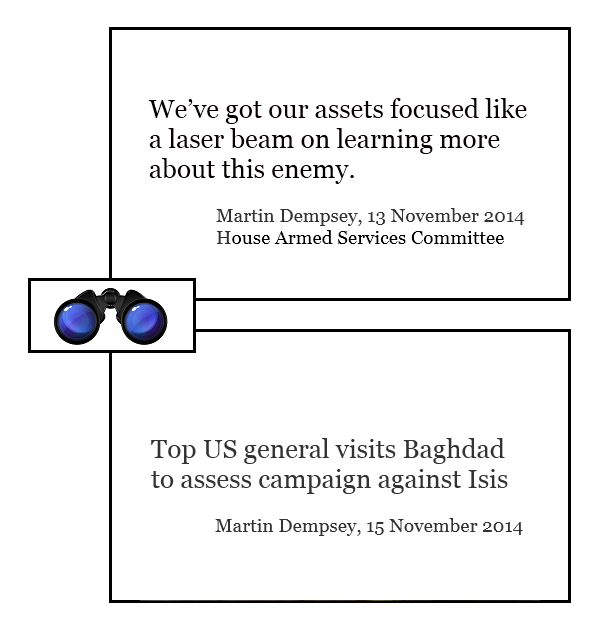[ by Charles Cameron — having the sense that we don’t know enough is the first step in the learning curve ]
.
There are various tips of the spear — Dempsey is the vertical tip, and he seems to be walking his talk:
But behind both walk and talk there’s a question: what’s up?
And that’s a question not just for the vertical tip’o’the’spear, but for the forward-into-reality tip — the intelligence community. And hey-ho, guess what? We’re not at reality yet. In fact, the best we can hope for is models that are asymptotic to those aspects of reality that “matter most” — with “matter” here distinctly including “spirit” aka “morale”.
**
The significance of the religious driver can, for instance, can be gathered from Beware the Siren Song of ISIS:
While much focus has been centered on the economic incentives ISIS provides, its powerful religious and ideological appeal to Iraqi communities, particularly the younger generation, is perhaps most luring. It is simplistic to dismiss the ISIS Caliphate as neither “Islamic nor a state,” as is often stated in the Arabic press. Among Western governments, the religious dimension of the ISIS appeal is downplayed for two primary reasons: Admitting religion as a role is an acknowledgement that little can be done to stop the spread of ISIS. And two, if ISIS is about religion, then how is it that the vast majority of Muslims condemn the movement?
and:
ISIS leaders, from Abu Bakr al-Baghdadi to those younger “sheikhs” giving religious sermons in village gatherings, are always careful to reference Koranic verses and hadiths, or sayings of the Prophet Muhammad, to support their statements. For those too naïve to question the accuracy of these interpretations, it is easy to see how they are swayed and led to believe that this is indeed a correct reading of the holy texts. Their actions are thus portrayed as the duties of any righteous believer.
As part of the ideology, ISIS proposes an alternative to the current world order. For those who view the current state of affairs as a Western, imperialistic hegemony, ISIS is offering a different world view. Utilizing a religious narrative to do so largely contributes to its appeal.
That last short para, please note, will resonate with many other critics of “Western, imperialistic hegemony”. The perception of “western hegemony” as a problem is a common one, even among westerners, and if it’s a problem, it’s one to which many solutions might be suggested. To the extent that it is indeed a problem, it deserves attention — as, more obviously, does the proposed IS solution.
From the planning, and thus also budgetary, point of view, there’s the question of Air-Sand Battle:
For senior military leaders, the issue of the Islamic State, also known as ISIS and ISIL, “is as much about where the services are headed as it is about the problem to solve,” said David E. Johnson, a military analyst at Rand who from 2012 to 2014 directed the Army’s Strategic Studies Group for Army Chief of Staff Gen. Ray Odierno.
And for an insightful take on the IS side of things, here’s the key para from Aaron Zelin‘s piece The Islamic State’s Archipelago of Provinces, in which he fisks al-Baghdadi’s recent audio tape.
In addition to declaring the annexations, Baghdadi made clear to his associates in Saudi Arabia and Yemen that it is time to start an overt military campaign against the rafidah, a derogatory term for Shiites that literally means “rejectionists.” He also emphasized the order of priority, stating that jihadists in Wilayat al-Haramayn (“The Province of the Two Holy Places,” meaning Saudi Arabia) and Wilayat Yemen should first target Shiites (including the Houthis), then the Saudi dynasty, and then finally the “Crusaders.” In doing so, he formally clarified how the Islamic State perceives its enemies and its most immediate threat, while also illustrating its differences from al-Qaeda, an organization that has historically given precedent to fighting the “Crusaders” first.
**
There are, of course, many other headlines describing Dempsey’s visit to Iraq that I could have chosen to work with, corresponding to the many different ways of seeing his visit in context:
The Globe and Mail: Top U.S. military officer says battle with Islamic State starting to turn CNN: U.S. Joint Chiefs chairman goes to Iraq to discuss ISIS fight CS Monitor: As US considers boots on the ground, chairman of Joint Chiefs visits Iraq USA Today: Dempsey in Iraq amid Islamic State airstrike campaign
and so on. It was the suggestion that Dempsey want to Iraq to learn that interested me in the headline I chose:
The Guardian: Top US general visits Baghdad to assess campaign against Isis
— and indeed, it’s that emphasis on learning, paralleling his own phrase “focused like a laser beam on learning”, that IMO gives my DoubleQuote its edge.
**
The quote about the laser beam comes from Akbar Ahmed‘s piece, What Washington Doesn’t Get About ISIS, on Politico. Key paras here, IMO:
Tribal Islam
What Washington has not been able to wrap its mind around is the fact that tribal people like those that form ISIS live in a particular culture and society. They identify themselves as Muslim and take great pride in that fact, but they also take similar pride in their identity as tribal people. While most analysts look to religion—Islam and the Quran—to describe these societies, they almost entirely miss their tribal character. Without it, it is impossible to make sense of ISIS or the tribal societies in other parts of the Muslim world where America has taken military action since 9/11.
The Code of Honor
The core feature that defines Muslim tribal people—including those fighting under the banner of ISIS—across the Muslim world is belonging to a particular family or clan group who all believe they are descended from a common ancestor. Their actions are defined by a code of honor which emphasizes hospitality towards strangers, bravery and courage in battle, and, crucially, revenge.



